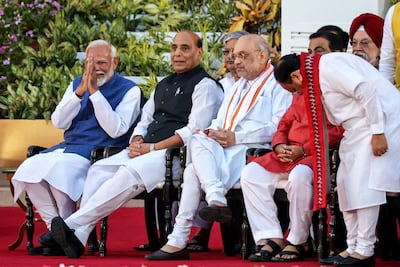Indian Prime Minister Narendra Modi, who took charge of the office for a third term in a row on Monday, gave ministerial portfolios to his council, with several of his party members retaining important ministries in his first coalition government.
There had been speculation that Mr Modi's Bharitya Janata Party may lose such portfolios in the coalition government after it failed to achieve a clear majority at the polls, but the party has retained the most important ministries.
Amit Shah has retained the Ministry of Home Affairs, while Rajnath Singh will remain at the Defence Ministry for a second time as part of the new government.
Subrahmanyam Jaishankar and Nirmala Sitharaman will continue as Minister of External Affairs and Minister of Finance respectively.
Nitin Gadkari retained the Ministry of Road Transport and Highways.
Dharmendra Pradhan will continue as Minister of Education, and Bhupendra Yadav remains in charge of the Ministry of Environment, Forest and Climate Change of India.
BJP party president Jagat Prakash Nadda has been assigned to the Ministry of Health, replacing Mansukh Mandaviya, who becomes Minister of Labour and Employment in the cabinet.

Mr Modi, 73, was sworn in as the Prime Minister on Sunday for a third consecutive term after his BJP-led National Democratic Alliance won the recently held parliamentary elections to Lok Sabha, the lower house, with 293 seats of the 543 seats.
He first gained power in 2014, when the BJP swept the board. It won with a bigger mandate in 2019. This term begins with him at the head of a coalition government.
On Sunday, he led the swearing-in of 71 members of his council, including seven ministers, but no Muslims. India is home to 210 million Muslims – its largest religious minority.
While the BJP did not win an absolute majority this year, Mr Modi formed the government with regional allies within the NDA, mainly the Telugu Desam Party from southern Andhra Pradesh and Janata Dal (United) from the eastern state of Bihar.
The TDP won 16 seats, while the JD(U) won 12. The parties, touted as kingmakers, had asked for prominent positions for their leaders in the cabinet.
They have also demanded the position of the Lok Sabha speaker and are still talking to the BJP.
The speaker is a constitutional and ceremonial head of the lower house of the Parliament and the post usually goes to the ruling alliance, while the deputy speaker’s post is by convention held by a member of the opposition.
Mr Modi has appointed Ram Nath Thakur of JD(U) as the junior agriculture and farmers welfare minister, while the TDP's Ram Mohan Naidu has been appointed as Civil Aviation Minister.
The Prime Minister began his third term by signing into law a farmer’s welfare scheme that provides a tranche of a cash payments to 93 million farmers.
Two-thirds of India's 1.4 billion people draw their livelihood from agriculture, which accounts for nearly a fifth of the country's gross domestic product.
Rahul Gandhi, Mr Modi's chief rival, was nominated on Saturday to lead India's opposition in parliament, after he defied pre-election forecasts to help the Congress party nearly double its seats.
No date has been set for the opening of parliament, but Indian media have reported the new session is expected to begin next week, when the speaker will be elected.


